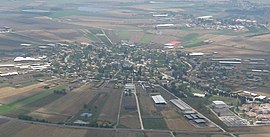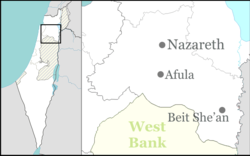Nahalal
|
Nahalal נַהֲלָל |
|
|---|---|

Aerial view of Nahalal
|
|
| Coordinates: 32°41′24″N 35°11′48″E / 32.69000°N 35.19667°ECoordinates: 32°41′24″N 35°11′48″E / 32.69000°N 35.19667°E | |
| District | Northern |
| Council | Jezreel Valley |
| Affiliation | Moshavim Movement |
| Founded | 1921 |
| Founded by | Jews from Eastern Europe |
| Population (2015) | 962 |
Nahalal (Hebrew: נַהֲלָל) in northern Israel was a Levitical city mentioned in the Hebrew Bible, and is now a moshav. Covering 8.5 square kilometers, it falls under the jurisdiction of Jezreel Valley Regional Council. In 2015 it had a population of 962.
Nahalal was a Levitical city located in the territory of the tribe of Zebulun (Joshua 19:15) and given to the Merarite division of the Levite tribe.
Founded in 1921, it was the first moshav ovidim (workers' cooperative agricultural settlement) in British Palestine.
The modern moshav was designed by Richard Kauffmann and was established in 1921. Its founders immigrated to Mandate Palestine from Eastern Europe in what is known as the Second Aliyah and Third Aliyah between 1904 and 1914 (at the end of the Ottoman rule), some of whom had been members of the first kibbutz, Degania. After working in farming communities for a decade, they dreamt of establishing an income-sharing farming community similar to a kibbutz, but they wanted to maintain the nuclear household structure (kibbutzim had communal dining and children slept in separate housing).
...
Wikipedia

